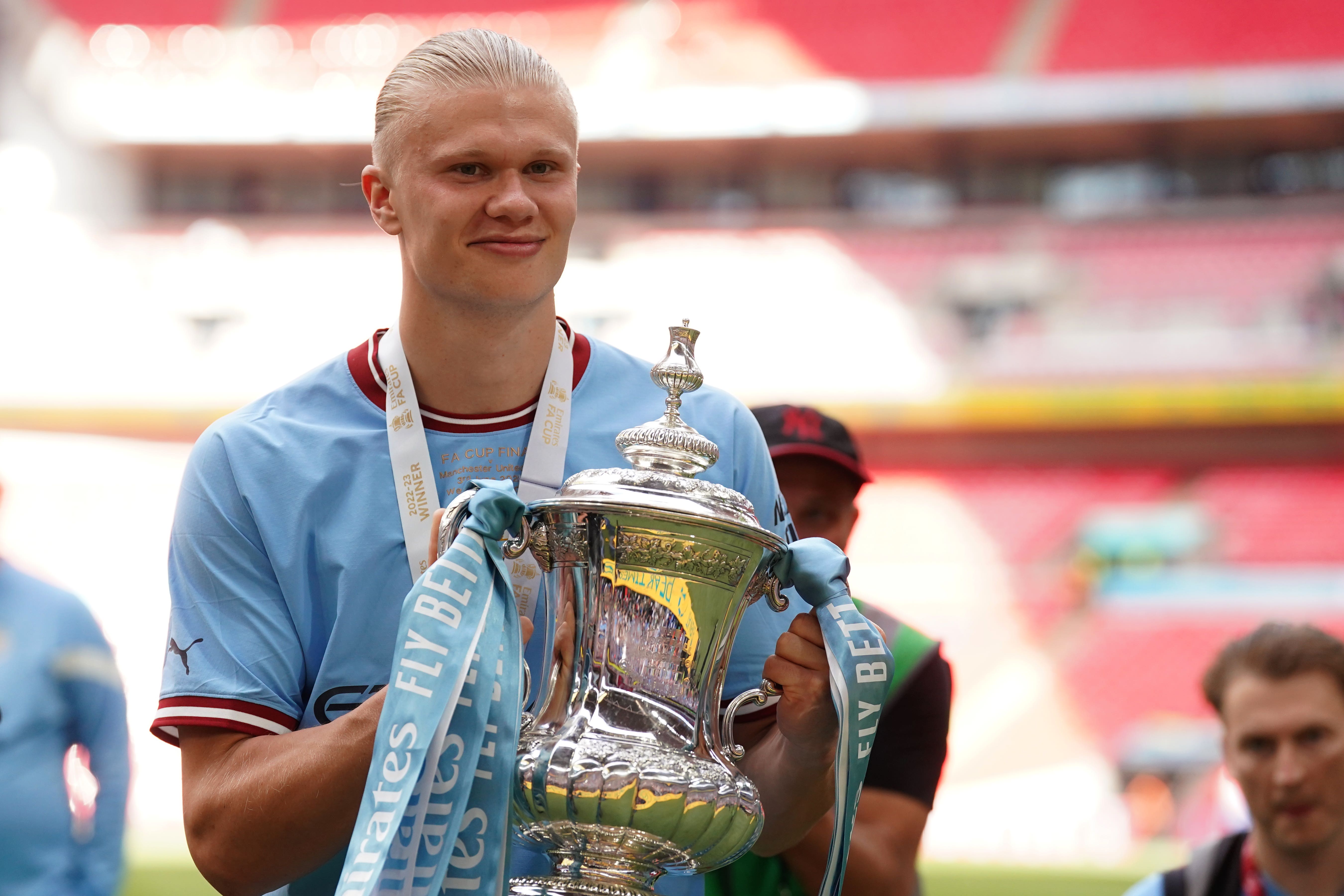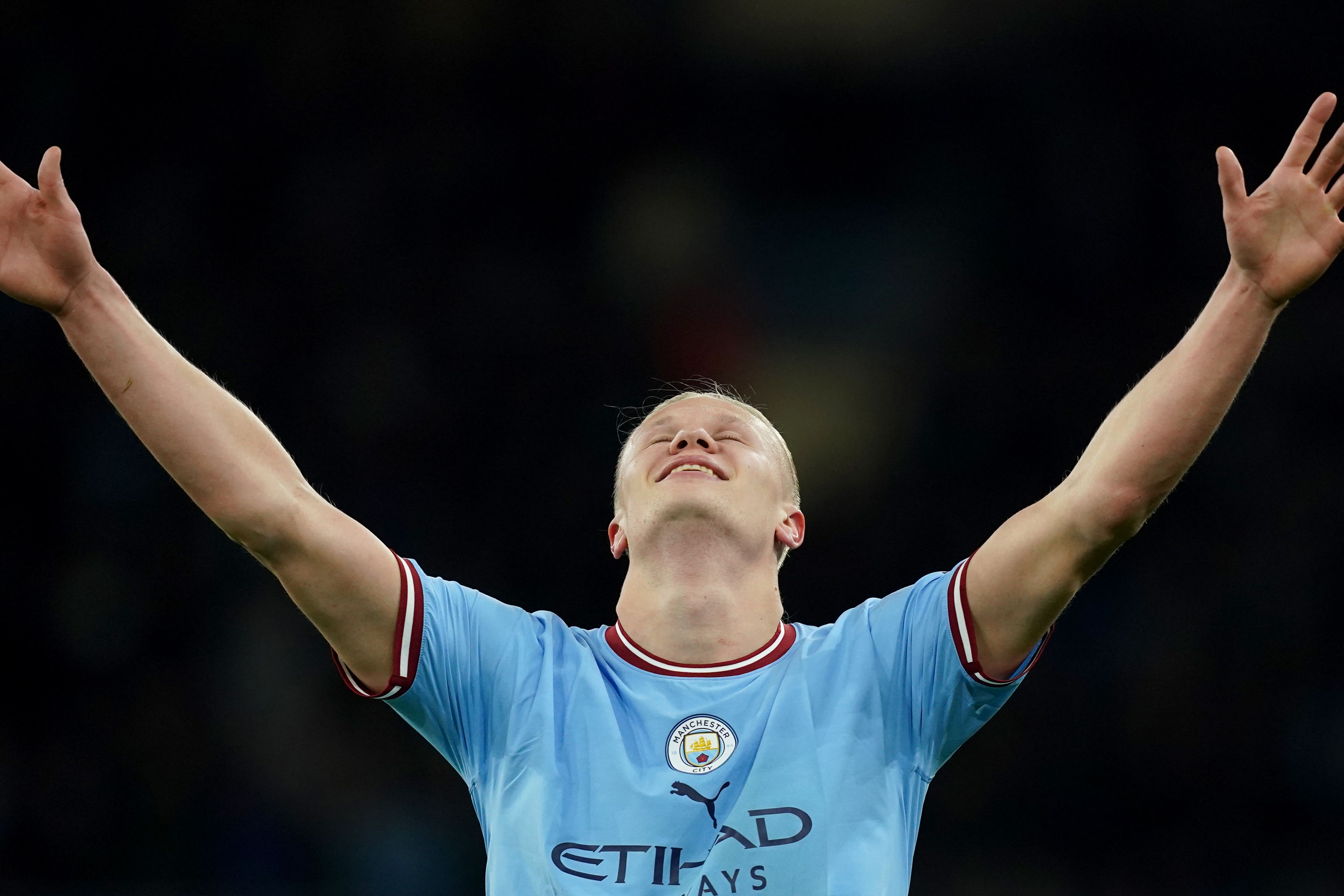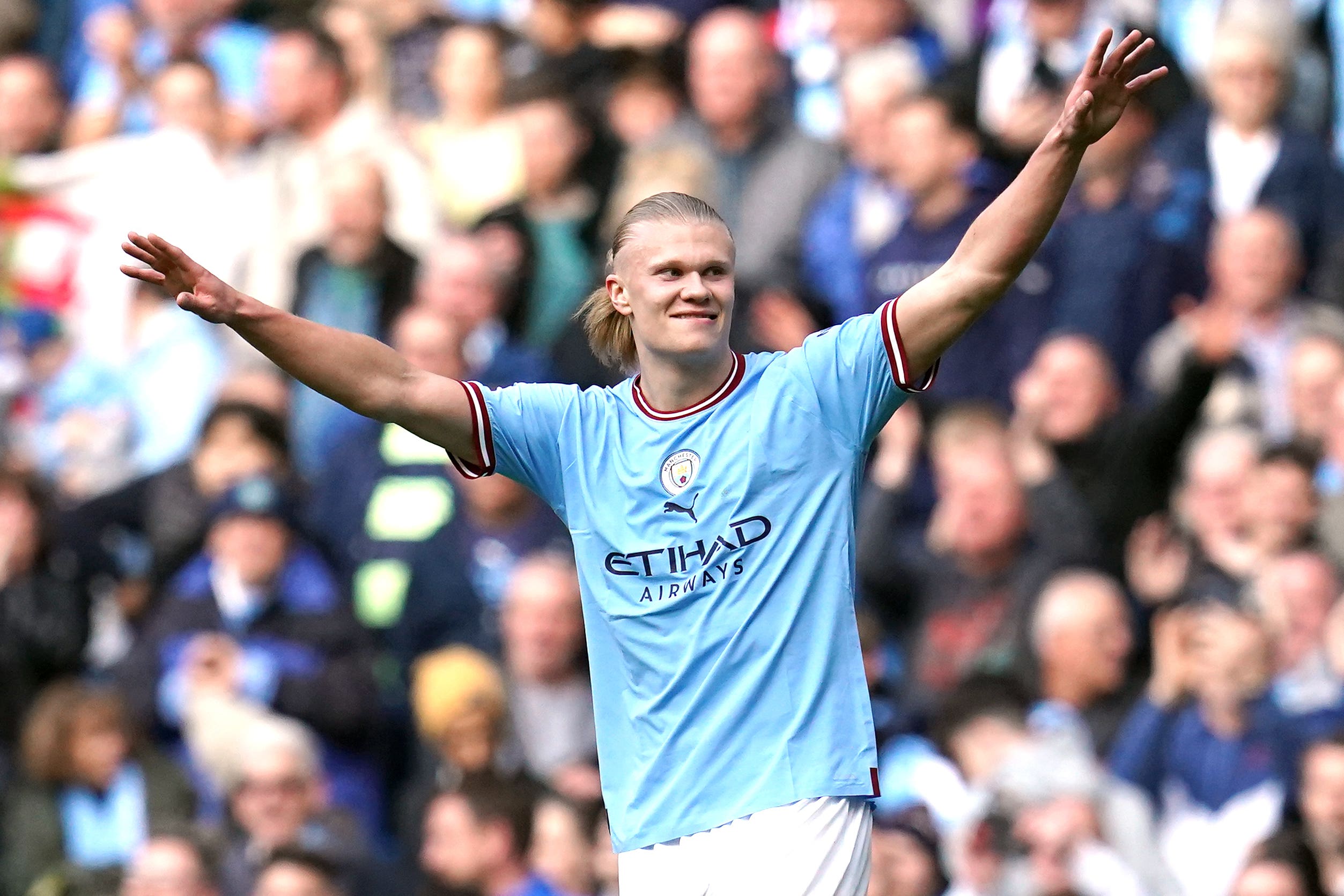The trick that made Erling Haaland the ultimate finisher – in more ways than one
The Norwegian has provided the perfect solution to Man City’s ‘problem’ on and off the pitch

Your support helps us to tell the story
From reproductive rights to climate change to Big Tech, The Independent is on the ground when the story is developing. Whether it's investigating the financials of Elon Musk's pro-Trump PAC or producing our latest documentary, 'The A Word', which shines a light on the American women fighting for reproductive rights, we know how important it is to parse out the facts from the messaging.
At such a critical moment in US history, we need reporters on the ground. Your donation allows us to keep sending journalists to speak to both sides of the story.
The Independent is trusted by Americans across the entire political spectrum. And unlike many other quality news outlets, we choose not to lock Americans out of our reporting and analysis with paywalls. We believe quality journalism should be available to everyone, paid for by those who can afford it.
Your support makes all the difference.A few months after Manchester City’s last Champions League final, when it became clear there would be no deal for Harry Kane – and, crucially, that no other Premier League club was in for him – one senior executive closed a meeting and the matter with two words.
The club decided there and then they were going all in on the Norwegian. Now, mere hours before their next Champions League final, so much comes down to Haaland. He is certainly the player that Simone Inzaghi has been most obsessed with figuring out how to stop.
The 22-year-old is the finisher: his instinct and technique has brought 52 goals in his debut City season. He also represents the final piece of the puzzle in a brilliant team that now stands on the brink of total domination and the culmination of this entire Abu Dhabi project.
The scale of City's last three months – where the team have simply brutalised their closest rivals as well as any sense of sporting competition – would have been impossible to imagine for most of football history. There’s been no messing about in this run-in, either in terms of Pep Guardiola’s tactics or – consequently – the games. Everything comes from fitting in Haaland. Guardiola knows the No 9 has to go into the team in a specific way, so figures out the team from that.
Those who have worked with the Catalan say it has brought about a satisfying symmetry to his own career, in that he eventually went back to his football roots. Locking himself away in front of match footage for hours on end, Guardiola ruminated on a lot of tactical possibilities behind Haaland. He gradually realised that the defensive box Johan Cruyff played to win Barcelona their first Champions League final in 1992 was perfect. Everything flowed through that, from the ball itself and the smooth control of space to Kevin De Bruyne’s positioning behind Haaland.
It is all the more fitting that Guardiola himself stood at the top of that box for Cruyff, to win his sole Champions League as a player. The system may now bring him his third as a manager, as part of a treble.
Three into nine goes very cleanly – if, in this case, after a time. Guardiola has also been seeking to evolve Haaland as a player over this period, adding other attributes to his game. That could be seen with the cross for Bernardo Silva against Arsenal. Such contributions are a consequence of training sessions where Guardiola humorously calls his player “Haaland!” rather than by his first name, as he does with most other squad members.

It should of course be stressed that considerable perspective is required on the nature of the “problem” this posed. City scored 99 goals in the league last season, and missed two glaring chances at Real Madrid late on, which would have otherwise brought another Champions League final. To this, they added a player who can already be described as perhaps the greatest goal machine in modern football. He is after all the first that has even threatened Dixie Dean’s record 63-goal season.
That is about as good a “problem” as you can have. The focus on the mere £51m transfer fee as if this was some bargain has also been misleading, since this still came down to money in the most reductive way possible. That fee was a release clause specifically requested by sports agent Mino Raiola in order to give the player an even greater control of his future. It also meant this came down to the attractiveness of the offer to Haaland’s camp, both in terms of finance and football, with the latter of course entirely dependent on the former. They involved sensational sums, as regards basic wages and potential bonuses, and a reported agent fee of £34m.
With Guardiola, though, it’s never just a case of throwing money at something and just throwing a player into a team. He simply doesn’t think that way. It was why the Catalan for a long time preferred Kane for his build-up play. Guardiola doesn’t just want to find a place for a player. He tries to find a way for everything to be maximised within his ideology.
This is what he gradually did with Haaland, although that also required a bit of a shift in thinking. Even Guardiola had to get his head around a certain image he had in his head. It is admittedly a powerful image – literally.
Haaland’s sheer size at 6ft 4in inevitably creates the perception of a power player, like a modern football version of Jonah Lomu; like he is playing to a totally different scale and level. The Norwegian can do that but the reality is that most of his goals come from a very different mindset. Haaland’s great trick is really that he is a stealth player, with the movement of a more diminutive striker who has had to think about it. This is maybe not a surprise since this is exactly what Haaland was. It comes from figuring out the game as he grew.

“Erling was almost too good for his own age, so he played more and more with older boys,” Alf Ingve Berntsen, who coached Haaland at Bryne FK, told the Independent previously. “He was a bit shorter than them, and skinny, so in order to keep scoring he had to be smarter in the box. He knew early on what movements he had to make, when to make a feint, when to wait, when to get away. And he has gradually increased his explosiveness, and his smartness. He is a mix of both instinct and education.”
He now has Guardiola’s coaching to amplify that further. It has also created an interesting discussion within football, that will influence this Champions League final.
Haaland’s unprecedented impact has naturally led to defenders talking about him a lot, and a growing belief is that it’s a mistake to fixate on his physical size. Most players after all think they can’t win a battle with the Norwegian, so naturally give him that extra space. This is actually playing into his hands, since Haaland’s movement will always be superior. He’s a few steps ahead mentally.
So, as Real Madrid’s Antonio Rudiger realised, the trick is to try and distract the forward by drawing him into a physical battle. This prick to Haaland’s pride, some believe, means he gets caught up in the fight rather than simply streaking away. Inter Milan head coach Simone Inzaghi has already been considering this for the Champions League final, and does have some ideal defenders for this in Alessandro Bastoni and, perhaps, the returning Milan Skriniar.
It might be the only way to prevent what has become one of the most awesome sights in football: Haaland at full pace.

Again, it is like Lomu in 1995. Even Haaland’s teammates have stopped in training and said “wow”. It’s something you just have to see. It’s box office.
Since the money rolled in, City has been blessed with series of world-class individuals, but the nature of the football project has meant even those of the calibre of Sergio Aguero get subsumed into the collective whole. They have been appreciated on an aesthetic and technical level.
That isn’t the case with Haaland. The reaction is that instinctive “wow”.
He is captivating.
This is a powerful tool for a sporting project that is ultimately about the normalising of the emirate of Abu Dhabi. It also puts Haaland in an odd position, given that Norway has been one of the countries where “sportswashing” has been most debated.
“Haaland’s transfer to Manchester City, which in practice is owned by the UAE, was controversial,” explains Frank Conde Tangberg, policy adviser for Amnesty Norway. The transfer went through not too long after the Norwegian national team protested against the human rights violations in Qatar.
“There has also been a bit of backlash against the media coverage, as it has been very focused on Norway’s two superstars; Erling Haaland and Martin Odegaard. Many will agree that the coverage of their performances this season, to a certain extent, has come at the cost of stories that have a more critical approach to sportswashing.
“Manchester City were bought to improve the UAE’s image, to create positive associations which would build legitimacy and open doors that would allow the UAE to diversify its economy. This ultimately also helps consolidate the power of the regime, especially when they’re able to do this without too many questions being asked about their human rights record.
"That reputational improvement happens by attracting superstars and winning titles. Haaland gives City and its owners both; superstar quality off and on the pitch. That also gets you that loyalty from many fans who not only are willing to look away from those human rights violations, but they actively praise the owners.”
Tangberg is one of many who think the focus should be on authorities who have allowed the situation to happen, and that it isn’t fair to interrogate the players – albeit with a caveat.
“In the absence of action from the governing bodies, players can use their platform and fame to exert enormous influence. That doesn’t mean they have a responsibility in terms of international human rights. Nor does it mean that they should put their head in the sand.”
That is one debate that hasn’t really started yet.
On Saturday, however, Haaland can play a huge part in bringing this stage of the Abu Dhabi project to a close.
It's something that has long been said of Guardiola's 12 years without a Champions League, after all. That, in that game, in that moment, he could just do with a finisher to put the ball in the net.
He now has the ultimate finisher.



Join our commenting forum
Join thought-provoking conversations, follow other Independent readers and see their replies
Comments